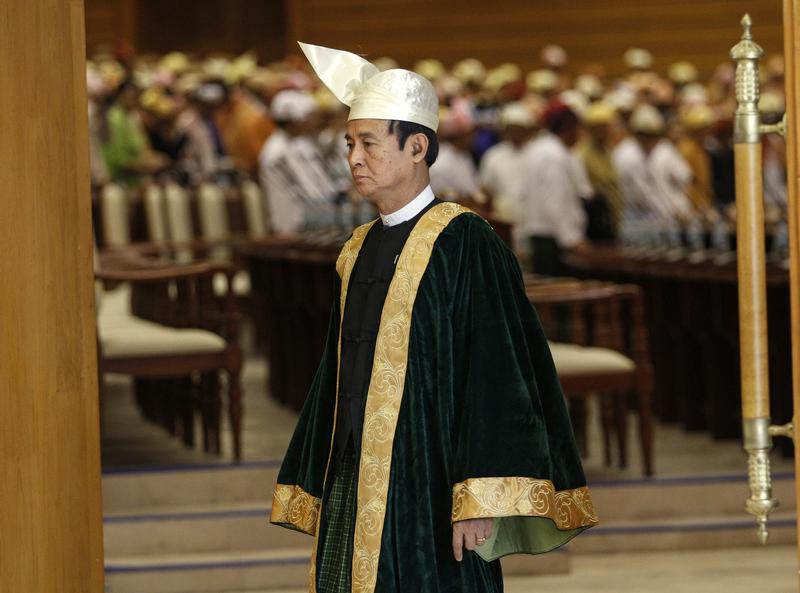Burma on Wednesday took its latest wobbly step in an ongoing transition, theoretically toward democratic governance, with Parliament voting for Win Myint as president, a National League for Democracy (NLD) stalwart who will now serve, ostensibly, as the country’s most powerful civilian leader.
Securing 403 votes out of 636 ballots cast, Win Myint beat out fellow vice presidents Myint Swe and Henry Van Thio in an election that he was widely expected to win. Myint Swe garnered 211 votes, and Van Thio received just 18, locking in their statuses as vice president Nos. 1 and 2, respectively, positions they also held after a similar election in March 2016.
Twenty lawmakers were absent from Wednesday’s vote and four ballots were ruled invalid.
The former Lower House Speaker Win Myint assumes a role whose predecessor Htin Kyaw unexpectedly stepped down one week ago, citing a desire “to take a rest from duties,” in what has widely been reported as a reflection of the ex-president’s ailing health.
But regardless of cause and effect, a cloud of uncertainty hangs over the true significance of this moment.
Governing within the confines of a prohibitive, military-drafted Constitution and further tethered by State Counsellor Aung San Suu Kyi — who in the lead-up to the 2015 election famously declared that she would occupy a plane “above the president” should her party ride to electoral victory — the political import of Wednesday’s vote is not clear. Few expect that it signals a dramatic or even marginal shift from the status quo — a much-hailed 2015 election victory for the NLD that has resulted in widespread disaffection in-country and blistering criticism from abroad, particularly as the crisis in Rakhine State has spiraled out of control since the party took power in April 2016.
A familiar face
A lawyer by trade, Win Myint was regarded as a competent and stern steward of the gavel during his time as speaker of the Lower House, in the process drawing disapproval from some — particularly non-NLD lawmakers who at times have criticised him as a stifling presence. Military MPs and the nominally civilian party that they support, the Union Solidarity and Development Party, famously accused him of “democratic bullying” on more than one occasion over the way he has conducted proceedings in the lower chamber.
In 1990, Win Myint was elected to represent Danubyu Township, when the ruling junta of the time held an abortive vote that it did not recognise in the face of the landslide NLD win of which he was a part. He ran again in the 2012 by-election, representing Pathein Township in Irrawaddy Region, in a vote that brought him and Suu Kyi into formal parliamentary politics as members of the Lower House.
[related]
Unlike Win Myint, the 71-year-old Htin Kyaw had no formal political experience before assuming the presidency. Though vested with significant authority under the Constitution, Htin Kyaw was considered a ceremonial head of state, with Suu Kyi calling the shots, and it remains to be seen how the working relationship and power dynamics between the former speaker and the state counsellor will play out. It is worth noting that he has been described as a Suu Kyi loyalist and has been with the NLD since its earliest days.
In contrast to a Union Parliament that has often proven incapable or unwilling to move quickly on legislative matters of substance, the election of Win Myint came relatively quickly, spurred by the constitutional requirement that a new president be selected within seven days of Htin Kyaw’s resignation.
Shortly after the public statement that Htin Kyaw was stepping down, it was announced that Win Myint had also resigned his post as Lower House speaker, leading to widespread speculation that he was angling for president-in-waiting status. That conjecture was fortified by his selection as the Lower House’s pick for vice president and concurrently one of the three presidential nominees, in a decisive vote on 23 March.
Change or stasis?
Win Myint inherits an apparatus of state in which the national legislature is overwhelmingly in the palm of his hand — nearly 80 percent of elected seats share his NLD allegiance — but also a judiciary that has proven stubborn to reforming into a co-equal and independent branch of government. And then there is the military, which in addition to holding 25 percent of seats in Parliament by constitutional fiat, also controls three of the most consequential ministers in his cabinet: the generals who run the ministries of Home Affairs, Defence and Border Affairs.
Last week the former First Lady Su Su Lwin appeared to downplay the significance of the changes afoot, insisting that her husband had never intended to serve his full five-year term as president. But whatever the true motivations underpinning Htin Kyaw’s sudden resignation, there could be no denying that Burma was headed for uncharted territory, with lawmakers required to pick a new president within a week — and in doing so, a new leader whom precedent suggests will simply act as a proxy for Suu Kyi.
Win Myint, age 66, will serve as president until March 2021 at least, barring any unforeseen political developments. He is due to be sworn in on Thursday.



